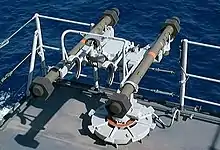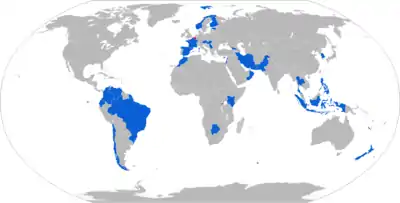Mistral (missile)
Mistral is an infrared homing MANPADS manufactured by the European multinational company MBDA missile systems (formerly by Matra BAe Dynamics). Based on the French SATCP (Sol-Air À Très Courte Portée), the portable missile later to become the Mistral began development in 1974. It was initially deployed in 1988 for the first version (S1), 1997 for the second version (M2), and 2019 for the third version (M3).
| Mistral | |
|---|---|
 Mistral missiles on a Simbad mount | |
| Type | Manportable surface-to-air missile |
| Place of origin | France |
| Service history | |
| In service | 1988–present |
| Used by | See Operators |
| Wars | Second Congo War |
| Production history | |
| Designer | MBDA |
| Designed | 1974 |
| Manufacturer | MBDA |
| Specifications | |
| Length | 1.86 m |
| Diameter | 90 mm |
| Crew | 1 |
| Effective firing range | up to 6 km |
| Warhead | High Explosive with high density tungsten balls |
| Warhead weight | 2.95 kg |
Detonation mechanism | Laser proximity or impact triggered |
| Engine | Solid Rocket Motor |
| Maximum speed | 800 m/s, approx. Mach 2.6 (high supersonic) |
Guidance system | Infrared homing |
Weapon platforms
The basic Mistral missile is used with a man-portable launch unit. There are also launch units that allow the missile to be fired from armoured vehicles, ships or helicopters (such as the Aérospatiale Gazelle, Denel Rooivalk, or Eurocopter Tiger). To reject the flares ejected from the rear of the targeted aircraft, proportional navigation using a gyro as a reference is adopted for Mistral, instead of the pursuit method in earlier IR-guided MANPADS. To further enhance the ECCM capability, the seeker of Mistral has a very narrow field of view to reject decoys and interference, but the seeker can tilt in the range of +/− 38 degrees. On the launcher, the missile runs up the gyro in 2 seconds, and total reaction time is 5 seconds. The all-aspect two-color (2–4 and 3–5 µm) cooled IR-seeker of Mistral is developed by SAT, and the missile adopts both laser proximity and impact fuzes.
A close-in weapon system based on Mistral is a six-missile version called Sadral, with a stabilized rapid-reload launcher that is fully automated. A CSEE developed fire control director is integrated to the launcher, consisted of TV camera and FLIR. Image produced by both directors appear on the screen in the operator console below deck, and the missiles are locked onto the target before being launched. A fully loaded Sadral launcher weighs 1080 kg, and the operator console weighs 280 kg. A two-missile unit installed on ships is called Simbad, and a newly launched four-missile version is called Tetral. An evolution of the Simbad is now proposed: Simbad RC. Both Tetral and Simbad RC are remote controlled from the ship's deck while the original Simbad is manually operated with a simple optical sight.
 Mounted system on an ACMAT truck of the 54th Artillery regiment
Mounted system on an ACMAT truck of the 54th Artillery regiment Simbad missile defense system
Simbad missile defense system.jpg.webp) Sadral missile defense system aboard the French frigate Dupleix
Sadral missile defense system aboard the French frigate Dupleix
Inventory
The Mistral entered production in 1989 and is now deployed by 37 armed forces of 25 countries (eight countries in Europe, eight in the Asia-Pacific, five in South America, three in the Middle East), including Austria, the Brazilian Marine Corps, Chile, Colombia, Cyprus, Ecuador, Estonia, Finland, France, Hungary, Indonesia, Morocco, New Zealand, Norway, Oman, Pakistan, Philippines, South Korea, Singapore, Spain, and Venezuela.
Combat history
Mistral missiles used by the Rwandan forces in the Second Congo War shot down a Zimbabwean Air Force BAE Hawk fighter on March 23, 1999.[1]
Submarine Air Defence Weapon
On 26 September 2012 DCNS at the company's Le Mourillon plant announced plans to design and build a submarine canister-based air defence weapon based on the Mistral. The concept is similar to the British Submarine Launched Airflight Missile developed by Vickers in the 1970s and tested on HMS Aeneas and three boats of the Gal-class.[2]
SIMBAD-RC
SIMBAD-RC is a naval remote controlled turret using Mistral missiles developed by MBDA.[3]
Operators


Current operators
Former operators
.svg.png.webp) Belgium[7]
Belgium[7] New Zealand (not listed among current New Zealand Army equipment by IISS Military Balance 2017)
New Zealand (not listed among current New Zealand Army equipment by IISS Military Balance 2017)
Images
See also
References
- Cooper, Tom. "Zaire/DR.Congo 1980-2001". ACIG.org. Archived from the original on 25 January 2013. Retrieved 22 January 2013.
- Janes International Defence Review Vol 45 France revives hard-kill submarine defences, page XIV
- "Archived copy". Archived from the original on 2019-03-06. Retrieved 2019-03-04.CS1 maint: archived copy as title (link)
- "Botswana acquired 300 million euros of French weaponry in 2016". Defence Web. 3 August 2017. Archived from the original on 3 August 2017. Retrieved 3 August 2017.
- Kaitsevägi, Eesti. "Õhutõrjepataljon - Kaitsevägi". www.mil.ee. Archived from the original on 2014-10-15. Retrieved 2014-11-24.
- https://mags.shephardmedia.com/HB-samples-2018/AAD5-webmag.pdf
- Fiorenza, Nicholas (16 May 2017). "Belgium phases out Mistral". IHS Jane's 360. Brussels. Archived from the original on 16 May 2017. Retrieved 16 May 2017.
External links
| Wikimedia Commons has media related to Mistral missiles. |

